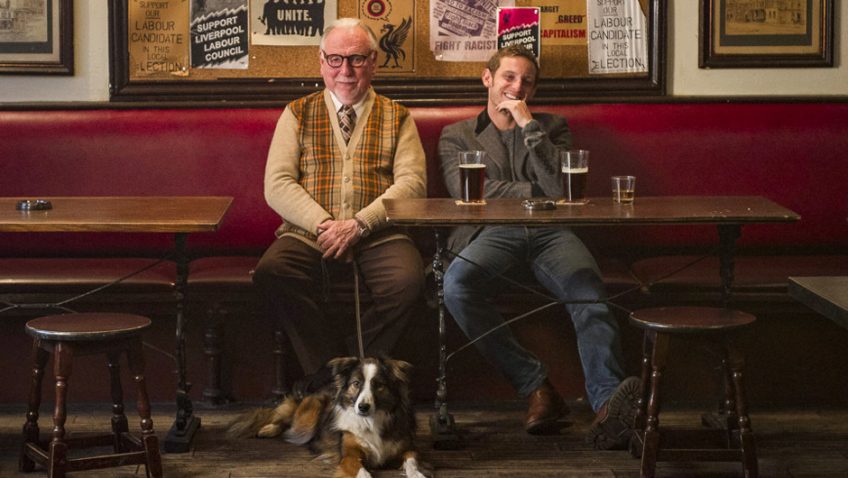Joyce Glasser reviews Film Stars Don’t Die in Liverpool (November 16, 2017) Cert. 15, 106 min.
Gloria Grahame was nominated for an Oscar for the 1947 film noir Crossfire and won one for her supporting role in Vincent Minnelli’s The Bad and the Beautiful, an insider’s look at the sleazy, sexist power game side of Hollywood that is once again having a public airing. Minnelli, who was married to 5-time married Judy Garland knew all about it. It was a prescient award because like Garland and Monroe, Grahame was one of Tinsel Town’s biggest victims. If Howard Hughes’ refusal to release her from her contract cost her several plum roles, and her obsession with her looks caused her to undergo disastrous plastic surgery, it was age and a scandalous personal life that turned her into a Hollywood outcast, jobbing in British regional theatres in her mid-fifties. She made her feature film debut in It’s a Wonderful Life in 1946, but when cancer struck in 1974 (finally killing her in 1981) her life resembled one of the Shakespearean tragedies that she longed to star in.
Film Stars Don’t Die in Liverpool
is a faithful adaptation of the memoir written by Liverpudlian actor Peter Turner in 1986. It is, of course, the idea of a struggling minor actor from Liverpool having a special relationship with a famous Hollywood actress that is the catch for this film, just as it was for My Week with Marilyn. But the difference is not only that Grahame came to Turner’s family home to die, but that you believe every word of this affecting true story. Directing with a tad too much sentimentality and an overzealous insistence on 1970s period design, from a generally well-judged adaptation by Matt Greenhalgh (Nowhere Boy, Control) Paul McGuigan delivers an absorbing, if frustratingly underwhelming biopic.
Peter (Jamie Bell) met Grahame (Annette Bening) in London in 1979 when she was starring in The Glass Menagerie and had an intercontinental affair with the actress 27 years his senior that lasted for about two years. The film, which uses flashbacks to chronicle the evolution of their relationship, focuses on their reunion in late September 1981. After a brief separation during which Peter thought he had been dumped, out of the blue, Gloria calls him at his parent’s home in Liverpool. She has collapsed on the stage in Lancaster during a performance of ‘Rain’ and tells him that she needs a place to recuperate from what she refers to as ‘gas’ – and what the British refer to as indigestion.
This is not the best moment, as Peter’s parents, Bella and Joe (Julie Walters and Kenneth Cranham, both excellent) are nervously preparing their first long-haul trip to Australia to visit their estranged eldest son. Peter is appearing nightly in a farce about a vasectomy clinic. Bella feels responsible for their guest and unable to leave while Gloria stubbornly refuses the medical attention that everyone knows she needs. She has a pathological fear of doctors, but continues to smoke and drink.
The filmmakers handle the transition from past (both in London and in NYC and Los Angeles) skilfully, although to help us distinguish the Liverpool house from Grahame’s show biz penthouse in NYC and her caravan on Malibu Beach, the production design department goes into overdrive, presenting us with sets that compete with the action.
Nothing, though, can compete with the scene in which the future lovers meet in a boarding house in London when Peter happens by Gloria’s open door as she is practicing elocution. Peter, a struggling actor, knows a bit more about the actress from LA than does their landlady, but not much. True story: Gloria invites Peter in and asks him if he knows the film Saturday Night Fever. She needs to practice some dance moves and before long, the two are disco dancing and creating a rapport. We can smile at the recollection of Bell’s ballet moves in Billy Elliot (he still has it) but Bening, who at 59, is two years older than Grahame was at the time, is no slouch.
Nor can the heavy-handed decor compete with arguably the best scene in the film in which Gloria hosts a dinner party in her beachfront caravan to introduce Peter to her mother, Jeanne McDougall (Vanessa Redgrave) and her spiteful sister, ironically named Joy (Frances Barber).
Acting royalty is present in that claustrophobic caravan as Joy brings up Peter’s age, leading to the revelation that Gloria’s fourth and final husband, Timothy, was about Peter’s age. When Gloria leaves the room, Jeanne implores Peter not to marry Gloria. Joy drops the news that Timothy, to whom Gloria had been married for ten years, was her former stepson, the son of her second husband, Nicholas Ray, who directed Gloria in In a Lonely Place. While Grahame denied it, the story goes that their relationship began when Timothy was 13, and led to Ray’s divorcing her.
Peter realises that Gloria’s dream of playing Juliet on stage – and her fondness for Liverpool – stems from her British mother’s influence. The two used to recite Shakespeare’s big female roles when Gloria was growing up. Unfortunately, McGuigan and Greenhalgh translate this into a sentimental and (given Gloria’s condition at the time) nearly impossible to believe scene that is not in the memoir.
While always absorbing, the film needs more of these two electrifying scenes. And while the adaptation is admirably faithful, one can question some choices of omission. It is understandable that the filmmakers would want to restrain a tendency to contrast the dying woman upstairs with the surreal, chaotic household below, but by so doing they deny us some needed comic relief, particularly as the repetitive scenes of Gloria fading away upstairs grow as heavy as the décor.
One loss is the hilarious passage in which Peter, in good faith, hires a stubborn, alcoholic vasectomy nurse to care for their patient. More perplexing is the omission of the touching, true moment in which Peter, realising that Gloria cannot fit into her black heels, the only chic shoes that fit her large feet, retains them as a memento. Curiously, and for no reason, in the film, he packs them in her nearly empty suitcase.
Bening and Bell do their best to convince us that the attraction is more than one born of need and idolisation, but for some reason the film never persuades us, as does the memoir, of the basis of their love. The actors are both terrific, though, even if Bening runs out of options in portraying the star clinging to life in Liverpool.
You can watch the film trailer here:






